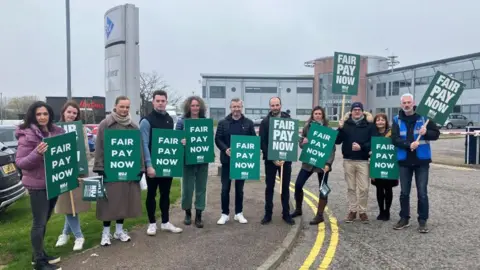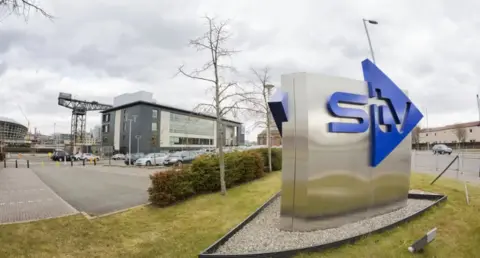STV journalists strike for second time
 BBC
BBCJournalists at STV are taking strike action for a second time after the latest pay offer put forward by the broadcaster was rejected by staff.
The strike on Wednesday will see programmes such as the News at Six bulletin and Scotland Tonight debate show pulled off air.
Staff at the company previously went on strike in March, with the National Union of Journalists (NUJ) saying they were seeking a "fair" 6% pay rise, but a second strike planned for April was cancelled as talks continued.
The channel said it was "disappointed" at the decision but alternative programming would air in place of news programmes.
 Getty Images
Getty ImagesThe strike will coincide with the broadcaster’s annual general meeting, where NUJ representatives, STUC representatives and individual staff will attend as shareholders.
Nick McGowan-Lowe, the NUJ's national organiser for Scotland, said that STV had shown "willingness" to end the dispute, but that it was "disappointing that once again our journalists are having to head out of the newsrooms and into the shareholder AGM to find out answers".
He added that they had been told by STV that a 6% pay increase - which the union says would keep pace with inflation - was "unaffordable".
The union has argued that salaries for journalists at the company have fallen behind equivalent roles at the BBC and ITV, which runs the rest of the channel three network.
The broadcaster's pay offer has been accepted by other staff at the company.
Fair settlement
However, the union said that the pay rise could easily be paid for via money that has been paid to chief executive Simon Pitts.
Mr McGowan-Lowe said: “A tiny fraction of chief executive Simon Pitt’s bonus would be enough to resolve this dispute for all 90 of the newsroom’s staff – and still leave him paid vastly more than the director general of the BBC – an organisation that is over 45 times larger than STV.”
An STV spokeswoman said the company had offered "enhanced" terms.
She said: "We understand that almost half of NUJ members voted to accept the enhanced offer, which included a bonus payment for all STV staff.
"We remain open to further dialogue but the NUJ's claim for an above inflation pay increase of 6% - nearly twice the current level of inflation - is unrealistic and unaffordable."
The spokeswoman added that the company considered their offer "fair and financially responsible".
The first one-day strike in the dispute saw newsroom staff form picket lines in Aberdeen, Dundee and Glasgow, while a separate demonstration at the Scottish Parliament attracted cross-party support.
At the time, First Minister Humza Yousaf called on STV to return to talks with the union to reach a fair settlement.
The second scheduled strike day, scheduled for Wednesday 16 April, was postponed after talks between the NUJ and management.
Following further talks, a package of proposals was put to NUJ members.

Unions once had huge power in commercial broadcasting.
Until the 1980s, industrial action could leave screens blank and meant the broadcaster would lose advertising revenue.
The strike by journalists at STV is not costing the company a single penny directly.
Network programmes and advertising went out normally during the first strike in March - the same is likely to happen on Wednesday.
Rules on the volume of advertising which only cover Channels 3, 4 and 5 mean that there are few commercials around the main news programme. So if the programme shown instead of the STV News at Six gets a relatively small audience it makes no difference to advertising revenue.
But the union believes it has other powerful weapons.
News is STV’s main legal obligation - it may lose money but it earns the company the right to broadcast on Channel 3. It also wins the company influence and respect.
The union has chosen the day of the company’s annual general meeting for action purposefully. It hopes to highlight its members' concerns to shareholders and put pressure on management to make a further improvement to its pay offer.
